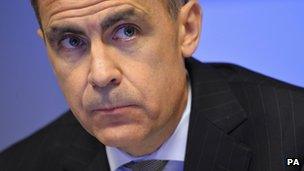Bank of England has no veto on Help to Buy, says governor
- Published

The governor of the Bank of England has warned it could assess Help to Buy at any time
The governor of the Bank of England, Mark Carney, has confirmed that the Bank does not have a veto over the government's Help to Buy scheme.
Earlier this year two government ministers suggested the Bank could decide to stop the scheme, should it wish to do so.
But in a letter to the chairman of the Treasury Committee, Mr Carney said the Bank's role is purely advisory.
He said it would be for the government to decide whether to end the scheme.
But he also warned that the Bank could make recommendations about it at any time.
"The Financial Policy Committee (FPC) is not constrained by the government's timetable for any such advice; it could make recommendations at any time," he wrote.
Help to Buy has already proved controversial, with some economists saying it has boosted house prices too quickly.
The second part of the scheme, under which the government guarantees mortgage repayments, began in October.
'Risks'
The chairman of The Treasury Committee, Andrew Tyrie, said the governor's letter was a step forward.
"The Bank of England has no power of veto over Help to Buy," he said.
"Responsibility for it lies with the government," he added.
The FPC has already been asked to assess the impact of Help to Buy each year.
Starting in September 2014, it will decide what effect the scheme has had on overall financial stability.
At the same time it will advise on whether the current price cap (£600,000), and the charges to lenders, are still suitable.
When the scheme ends in 2017, the FPC will also comment on any possible extension.
Later on Thursday, the FPC will publish its bi-annual report on financial stability, in which it will set out "the risks posed by recent and prospective developments" in the housing market.
- Published9 November 2013
- Published21 November 2013
- Published8 October 2013